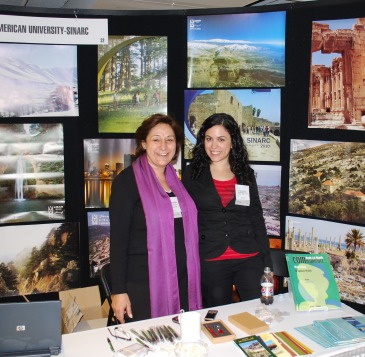Mimi Milki Jeha, Director of SINARC
Mimi Milki Jeha, Director of SINARC
Dr. Mimi Milki Jeha is the director of LAU’s Summer Institute for
Intensive Arabic Language and Culture (SINARC), a program designed to give people from around the world a chance to learn Arabic in a focused setting, while experiencing everything the Middle East has to offer.
We got the chance to ask Dr. Jeha questions as she prepares for the 2010 sessions of the program:
When was the program established, how long have you been directing it?
The program was established 13 years ago, and I have been directing it since 2004.

Dr. Jeha (left) with Joanna Helou from LAU’s New York office.
How many students on average do you have each summer/fall?
We were averaging close to 70 students each year. Some years because of political troubles in the city, students would drop out last minute, but we have always kept the program running no matter what. However, for the past few years, our summer group numbers have exceeded the 100 figure.
The fall semester was designed in 2006, and started operating in fall 2007. It only offers Intermediate and Advanced levels, and numbers have been on the rise, this year we had 20 students. We are now seriously considering running the Fall semester during the Spring semester as well.
Tell us more about the learning philosophy behind SINARC.
The program is designed to serve as an immersion program whereby the students follow a structured class of Modern Standard Arabic 15 hrs/week and a Lebanese Dialect class 5hrs/week. Both courses total 120 hours for the 6-week program, and are valued at 8 semester credits. Our faculty takes turns in providing homework help every evening between 5-7 pm. A team of LAU student assistants are always available to provide a helping hand wherever they are needed. Additionally, we host various experts in the field of Middle East Studies for weekly sessions on the politics and history of the region.
Weekends are usually composed of a Saturday trip to one of the tourist sights of the country, while Sundays are free for the students to enjoy Lebanon on their own. One of the overnight trip is to the north of Lebanon, to the City of Tripoli, and then to the cedars for a nice mountain evening and a hike the next morning to the highest peak in Lebanon, ending the day with a lovely picnic by the ponds of Orgosh and a joyous afternoon of Dabkeh and dancing! Another optional 3-day trip is to Damascus and the Palmyra ruins; the cost of which is normally separate from the program cost.
What should students expect as far as proficiency levels? Do you accept all levels?
We normally accept all levels in the summer sessions. Students could come in with very little or no Arabic and they go back singing Fayruz songs and able to formulate 3-4 sentence paragraphs.
Do you have a favorite SINARC memory?
All the SINARCs are favorites of mine; each group has left its own mark on us. Besides it is so amazing how the group blends together, and they maintain contact with each other after they have left SINARC.
Do students get to sample or cook any Lebanese food?
Authentic cooking demonstrations are offered, as well as an Oud nite at one of the Jemeisy’s prominent restaurants, as well as a Falafel Farewell lunch on the last day of the program. One faculty member also invites her class to her home for special cooking lessons, like rolling grapeleaves and the like.
How many trips do you go on, and where do you typically go?
We go on five trips. By the end of the program the students will have seen most of Lebanon
Do you find that foreign students have difficulty adjusting to the Lebanese culture? What are some of the resources available to help?
Students stay busy all through the six weeks that they are in SINARC. They never have a dull moment. Our student assistants serve as catalysts to help them understand the Lebanese community life and are especially helpful in directing newcomers towards a fuller understanding of the culture.
Is there anything new in store for the 2010 program?
Let’s wait and see. There will always be a special treat of what Lebanon is all about!
Latest posts:
- Live Chat with Manal El Tayar on studying at Sciences Po in France
- Live Chat with Salma Abdelnour, author of Jasmine and Fire
- LAU Facebook Cover Photos
- The Appointment of a New Provost
- Dr. Hussein Abbas and Dr. Ahmad Houri, co-authors of the Student’s Guide to Graduate Studies
- Live Chat with LAU President, Dr. Joseph Jabbra
- Prof. Fuad Hashwa and the MEDASTAR Program
- Live Chat with Dr. Mona Haidar on Social Medicine at LAU
- Live chat with Assistant Vice President for Enrollment Management Abdo G. Ghié
- Live Chat with LAU’s Vice President for University Advancement Mr. Richard Rumsey on social media at LAU
- More
Join us on Facebook:


 News and information
News and information Follow us on Twitter
Follow us on Twitter